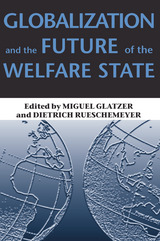
The authors offer a fresh and persuasive resolution to the controversy arising out of these contrasting traditions. Focusing on advanced industrial countries, Latin America, and the Caribbean, they find that the rise and persistence of democracy cannot be explained either by an overall structural correspondence between capitalism and democracy or by the role of the bourgeoisie as the agent of democratic reform. Rather, capitalist development is associated with democracy because it transforms the class structure, enlarging the working and middle classes, facilitating their self-organization, and thus making it more difficult for elites to exclude them. Simultaneously, development weakens the landed upper class, democracy's most consistent opponent.
The relationship of capitalist development to democracy, however, is not mechanical. As the authors show, it depends on a complex interplay of three clusters of power: the balance of power among social classes, power relations between the state and society, and transnational structures of economic and political power. Looking to the future, the book concludes with some reflections on current prospects for the development of stable democracy in Latin America and Eastern Europe.

In the last quarter of the twentieth century, the global political economy has undergone a profound transformation. Democracy has swept the globe, and both rich and developing nations must compete in an increasingly integrated world economy.
How are social welfare policies being affected by this wave of economic globalization? Leading researchers explore the complex question in this new comparative study. Shifting their focus from the more commonly studied, established welfare states of northwestern Europe, the authors of Globalization and the Future of the Welfare State examine policy development in the middle-income countries of southern and eastern Europe, Latin America, Russia, and East Asia.
Previous investigations into the effects of globalization on welfare states have generally come to one of two conclusions. The first is that a global economy undermines existing welfare states and obstructs new developments in social policy, as generous provisions place a burden on a nation's resources and its ability to compete in the international marketplace. In contrast, the second builds on the finding that economic openness is positively correlated with greater social spending, which suggests that globalization and welfare states can be mutually reinforcing.
Here the authors find that globalization and the success of the welfare state are by no means as incompatible as the first view implies. The developing countries analyzed demonstrate that although there is great variability across countries and regions, domestic political processes and institutions play key roles in managing the disruptions wrought by globalization.
READERS
Browse our collection.
PUBLISHERS
See BiblioVault's publisher services.
STUDENT SERVICES
Files for college accessibility offices.
UChicago Accessibility Resources
home | accessibility | search | about | contact us
BiblioVault ® 2001 - 2024
The University of Chicago Press









